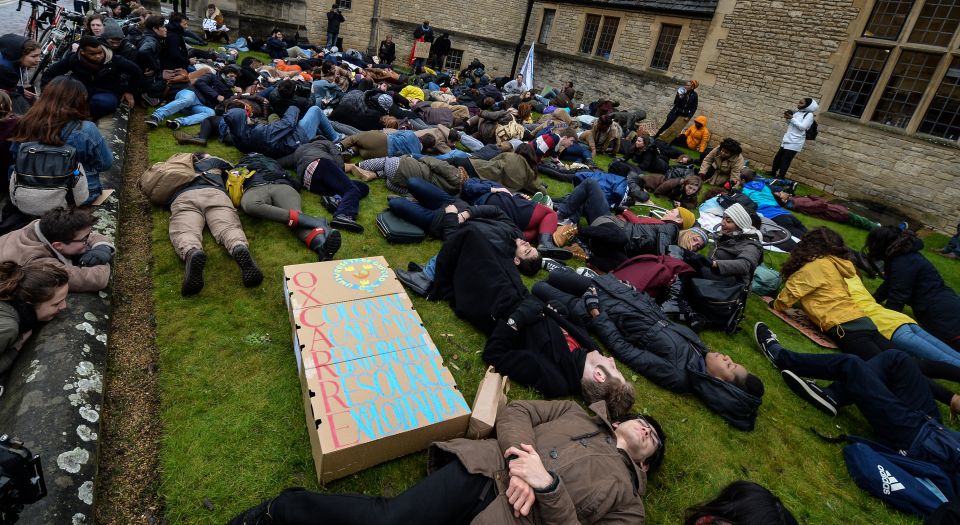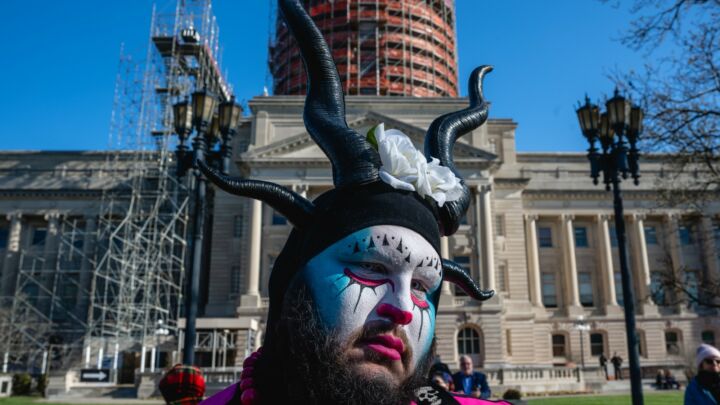
Long-read
The glamour of trauma
Afua Hirsch’s narcissistic book embodies everything that is wrong with identity politics.
Afua Hirsch, quite unintentionally, has provided us with a searing insight into the 21st-century politics of identity. Her narcissistic study of her personal identity – Brit(ish): On Race, Identity and Belonging – is intended to be a memoir-cum-treatise on what it’s like to be black and of African origin in Britain in the early part of the millennium. But it works far better as a glimpse, an often terrifying glimpse, into the myopia and backwardness and insatiable appetite for victim status that motors the identitarianism that is now the dominant ideology of the bourgeoisie. This book documenting a well-educated woman’s descent into the self-obsessive and self-victimising cult of identitarian thinking should serve as a warning to everyone to reject this politics.
I’m struggling to remember the last time I cringed so often while reading a book. Brit(ish) is in essence the story of a spectacularly privileged young woman trying to convince herself, and us, that she’s a victim of oppression. It’s the Four Yorkshiremen dialled up to 11. Ms Hirsch is a writer for the Guardian and frequently appears on broadcast media. She grew up in Wimbledon, possibly the leafiest of England’s leafy suburbs. I go there once a year – for the tennis tournament – and the London-Irish chip on my shoulder always throbs at the sight of the place. Hirsch’s childhood was one of ‘botanical English seasons’, ‘berry-stained rambles on Wimbledon Common’, and ‘walking holidays in the Alps’. She was privately educated, went to Oxford and then swanned into cushy jobs in the media. Lives don’t come more charmed or easy than this. But Hirsch sees it differently. She thinks she’s a victim. She is convinced that both horrible history and horrible people – you and me, that is – are conspiring to make her feel like an ‘other’. Because we’re racist. Everyone’s racist.
Hirsch’s attempts to show that behind the facade of her comfortable, berry-stained life there lurks a struggle against oppression are telling, and embarrassing. She argues that people who ask her ‘Where are you from?’ are acting a racist script that treats people like her as outsiders. That question, ‘The Question’, as she calls it, is a way for people ‘like me’ to be instructed that ‘they are different’. This, for real, is Exhibit A in her gauche effort to prove her life hasn’t been as plush as you think: a conversational question. She says she is asked this question ‘every single day, often multiple times’. Where is she hanging out? It is the ‘first thing’ she is asked in social encounters, and it is ‘often posed before a single word has been uttered’; it is a ‘daily ritual of unsettling’. I don’t believe this. Sorry. I do not believe that someone who mixes in middle-class media circles is cornered multiple times a day and asked, ‘WHERE ARE YOU FROM?’. Her interlocutors probably mean, ‘What broadsheet are you from?’. She should respond with ‘The Guardian’ rather than with the bizarre presumption that anyone who asks this question is fulfilling their duty as a white beneficiary of slavery and colonialism to remind people with dark skin that they are lesser people. Chill.
It gets worse. In her musings on ‘black bodies’, on the historic reduction of black people to slaves and the racist depiction of them as animals, she holds up her teenage diary as proof that she, too, feels the pain of the ‘black body’. ‘I have had enough of my figure, it is so disgusting. I WILL lose weight’, the 14-year-old Hirsch apparently wrote. A typical teen-girl worry, you might think. Oh no. Hirsch has now realised that her ‘self-hatred was centred on [my] sense of otherness’; her teenage ‘self-disgust’ was another thing inflicted upon her by a society seeped in racism towards ‘black bodies’. This is perverse. It would be like me holding up a teenage-diary entry about an acne breakout as proof that I was still in mental recovery from the fact that most of my family in the West of Ireland was wiped out in the Great Famine of the 1840s. I don’t think Hirsch realises how thoroughly she demeans the historical experiences of certain black communities when she compares her own pang of teenage distress as she looked in the mirror in her ‘lovely, spacious house’ with the obliteration of their autonomy that occurred during the slavery era or under colonialism. In the process of trying to imbue her own privileged life with the glamour of suffering, she belittles the profound suffering of earlier generations.
Things get really desperate when Hirsch and a friend have to go to Dunstable to investigate something called the Black Man’s Fan Club (BMFC) to try to prove that racism is still rife in post-Empire Britain. BMFC is a monthly swingers’ party at which white women come to have sex with black men. For Hirsch this is evidence that an anti-black hatred with ‘ancient and horrible roots’ still stalks this land. Or maybe it’s just a sex party? I’m just spitballing here. There is an unguarded moment when Hirsch discovers that the black men at these parties like the attention they get and she deduces that they must be suffering from ‘low self-esteem’ to be so ‘unquestioningly complicit’ in this racist event. And so does Hirsch dehumanise these men far more than the horny Dunstable ladies who want to fuck them do. Hirsch speaks of them as if they were automatons, moulded by social pressure; slaves, one might say, to history’s oppressive script. If only they were as educated as Hirsch, they might know better.
Hirsch sees these experiences – questions about her origins, her teen diary entries, the existence of biracial sex parties – as proof that racism remains widespread. And she sees herself as a 21st-century victim of historic crimes. So she says her ‘otherness’ is ‘loaded with millennia of extra baggage’. She writes: ‘The powerful ideologies that persuaded otherwise good-natured and reasonable people that Africans were closer to animals, fit to be bought and sold, have left a stain that lingers.’ In short, she still feels the pain of that history. Indeed, she opens the book with a quote from Claudia Rankine: ‘You can’t put the past behind you. It’s buried in you; it’s turned your flesh into its own cupboard.’ This highly deterministic, quite anti-human view of people as the products of history, as lugging around ‘millennia of baggage’, informs the entire book. It is an ugly worldview, diminishing the role of individual autonomy and collective struggle in the improvement of human life – and the improvement in black people’s lives has been vast – in favour of presenting people as hapless creatures doing history’s bidding or experiencing history’s wounds. Ironically, such a worldview merely replaces the racist era’s biological determinism that said black people were given to certain forms of behaviour with a historical determinism that says they are doomed to feel the otherness of their ancestors. In both accounts, the individualism, the adulthood, of black people is called into question.
Hirsch is really plundering the suffering of earlier generations in order to give more meaning to her own life. She is stealing the pain of others in order to add a gloss of agony, the glamour of trauma, to her own lovely, cushioned existence. We might call this historical appropriation, where extraordinarily privileged people, whether it’s Rhodes scholars at Oxford who claim to feel ‘pain’ when they walk past a statue of Cecil Rhodes or posh, well-paid female columnists insisting they are victims of ‘structural oppression’, must appropriate the experiences and horrors of long-gone generations in order to furnish themselves with the most prized social asset of our times: victim status.
This is what lies at the heart of identity politics: the sanctification of the victim; the prizing of suffering over moral independence; the privileging of ‘victim’ voices in media, academic and political debate; the celebration of pain and illness over self-government and heroism. The victim is the dominant cultural figure of our time. Everyone from eye-wateringly rich Hollywood actresses to Home Counties 20-year-olds studying at Cambridge wants the identity of victim. They recognise that it can boost their moral authority, and even improve their careers. Who do you think is more likely to get a column at a broadsheet today: the 25-year-old working-class lad from Stoke who is certain of himself and of his worldview and who wants to write about politics or the 25-year-old ethnic-minority woman who went to Oxford and who is suffering identity turmoil and wants to write about herself? We all know the answer to this question.
The struggle of the 21st-century identitarian, the vast majority of whom are middle-class and often well-off, is to fashion a victim identity. How to present as a victim when your every experience has been a comfortable and fortunate one – that is the query that motors much of what passes for radical politics now. This is what Hirsch is doing with this book: seeking to take her place among the new bourgeois of suffering by exaggerating her bad experiences or by marshalling the historic pain of others to her rather self-serving cause. I don’t think this is a very nice thing to do. It downplays historic barbarism to speak of it in the same breath as a posh Wimbledon girl’s decision to go on a diet. And to obsess over the ‘racism’ that lurks in every conversation and glance makes the present seem far uglier than it really is. Identitarianism relativises the past and libels the present. It obscures what was specific about earlier eras and it paints the everyday inhabitant of the present as a foul, prejudiced creature. It seems, rather alarmingly, that the new identitarians getting lovely book deals to examine themselves and excoriate the rest of us think this is a price worth paying for their ascent into the realm of the sainted victim. Their narrow needs take precedence over social ideals: identity politics summed up.
Brendan O’Neill is editor of spiked. Follow him at Instagram: @burntoakboy.
Brit(ish): On Race, Identity and Belonging, by Afua Hirsch, is published by Jonathan Cape. (Buy this book from Amazon(UK).)
Picture by: Getty Images.
No paywall. No subscriptions.
spiked is free for all.
Donate today to keep us fighting.
Donate onlineTo enquire about republishing spiked’s content, a right to reply or to request a correction, please contact the managing editor, Viv Regan.








Comments
Want to join the conversation?
Only spiked supporters and patrons, who donate regularly to us, can comment on our articles.